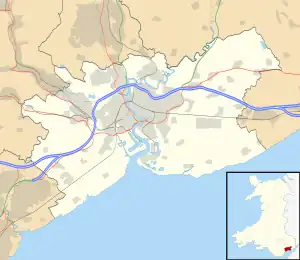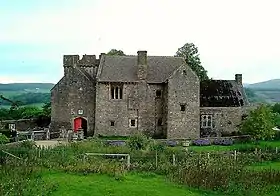| Penhow | |
|---|---|
 Penhow Location within Newport | |
| Population | 744 (2011 census[1]) |
| Principal area | |
| Country | Wales |
| Sovereign state | United Kingdom |
| Post town | CALDICOT |
| Postcode district | NP26 |
| Dialling code | 01633 Llanwern and Penhow exchanges |
| Police | Gwent |
| Fire | South Wales |
| Ambulance | Welsh |
| UK Parliament | |
| Senedd Cymru – Welsh Parliament | |
Penhow (Welsh: Pen-hŵ) is a small village and community (parish) just inside the eastern edge of the boundary of the city of Newport, South Wales, within the historic county of Monmouthshire. The name Penhow is believed to be derived from the Welsh word Pen meaning head or top and How derived from the Old Norse word Haugr meaning hill or mound.[2] The community includes the estate of Parc Seymour.
History and architecture
Roman remains
Fragments of Roman building material have been found in the area.[3] These include evidence of a Roman building at Llanvaches, an artefact at Penhow, and a Roman Road at Parc Seymour.[4]
Penhow Castle


Penhow is best known for Penhow Castle, which has claims to be the oldest inhabited castle in Wales.[lower-alpha 1][7][8] It was built by Sir Roger de St Maur, one of the Norman knights who served the Norman Lord of Striguil at Chepstow Castle. He built a tower house, and documentary evidence shows that he was at Penhow by 1129. It is the first known British home of the St Maur alias Seymour family which rose to national prominence in the 16th century in the person of Queen Jane Seymour, the third wife of King Henry VIII, represented today by the Duke of Somerset. Later the Seymour family, which moved to Hatch Beauchamp in Somerset and Wulfhall in Wiltshire, sold Penhow Castle to the Lewis family of St. Pierre, who converted the castle to a modern residence in 1674. Thomas Lewis' son Thomas was High Sheriff of the county, and married the daughter of Sir Richard Levett, Lord Mayor of London. The Lewis family retained ownership of Penhow Castle for several centuries.[9]
The castle, which has a reputation for being haunted,[10] was open to the public between 1978 and 2002.[11]
Church of St. John the Baptist
The parish church of St. John the Baptist is next to the castle. It has 13th-century origins and was the subject of restoration work in the 19th century.[3]
Village Shop[12]
Following the closure of the privately run shop in 2008, the Penhow Community banded together to finance & re-generate the village shop. Community volunteers re-decorated, re-stocked and re-opened the shop in November 2008. Since re-opening the shop has been managed and operated by the community and, where possible, stock has been sourced locally. Since opening, the team has had to learn how to be retailers and how to manage stock levels, but all the hard work has paid off and the shop continues to serve the local community.
Rock and Fountain
The Rock and Fountain Inn is a 17th-century coaching inn on the edge of the village. The historic inn and its five-acre site underwent a £1m renovation and redevelopment during 2010. The inn reopened as a steak and seafood restaurant in November 2010. It was later transformed into an Italian restaurant and closed a few years later. The Rock & Fountain opened again in June 2014 serving 2 courses for £10.
In February 2018, the Indian restaurant (located behind the Rock & Fountain) closed and in April, the building was transformed into a Churrascaria.
Penhow History Society
In 2016 a Penhow History Society was set up to examine Penhow's varied history. It was formed to research local history projects around the village and aims to promote a wider interest in its history through the publication of articles and organising public talks.[13]
Temperature record
Penhow also holds the current high record July temperature for Wales of 34.2 °C (93.5 °F), set on 18 July 2006.[14]
Government
Penhow has a community council comprising eight members.[15]
The area is part of the Bishton and Langstone ward for elections to Newport City Council.
Notes
- ↑ John Newman suggests Cardiff Castle, Fonmon Castle and St Donat's Castle as alternative claimants.[6]
References
- ↑ Office for National Statistics Parish Headcounts: Penhow
- ↑ The Village of Penhow Heritage Archived 2008-08-28 at the Wayback Machine
- 1 2 John Newman, The Buildings of Wales: Gwent/Monmouthshire, 2000, ISBN 0-14-071053-1
- ↑ "ARCHI Maps of British Archaeological Sites Location Data in Gwent near Penhow | Metal Detecting Finds | Treasure Hunting Findspots | Family History | Treasure Trove | Ancient History and Archaeology of Gwent Metal Detecting Finds & Treasure Hunting Findspots & Places at British National Grid Reference (NGR) co-ordinates at ST4290, ST 42 90, ST 42 90 | Treasure Map | ARCHI UK| archiUK". www.archiuk.com. Retrieved 20 September 2019.
- ↑ Wilhelmina, Duchess of Cleveland The Battle Abbey Roll with some Account of the Norman Lineages, 3 volumes, London, 1889, vol.1, Sent More
- ↑ Newman 1995, p. 552.
- ↑ "Penhow Castle". www.castlexplorer.co.uk. Castles of England, Scotland & Wales. Archived from the original on 14 April 2015. Retrieved 25 May 2018.
- ↑ Staff writer (16 April 2003). "Has Penhow Castle got American owners?". www.southwalesargus.co.uk. South Wales Argus.
- ↑ Penhow Castle, castlewales.com
- ↑ Psychic investigation at Penhow Castle
- ↑ Penhow Castle closes to the public
- ↑ "Penhow Community Information". www.penhowcommunity.org. Retrieved 15 January 2018.
- ↑ Penhow History Society
- ↑ New weather record as Wales wilts
- ↑ "Community council election nominees for Newport revealed". South Wales Argus. 6 April 2022. Retrieved 22 August 2022.
External links
- Geograph photos of Penhow area
- Castle Wales website on Penhow castle
- Penhow Community Council website
- Penhow History Group
